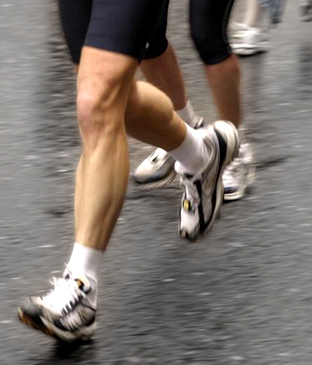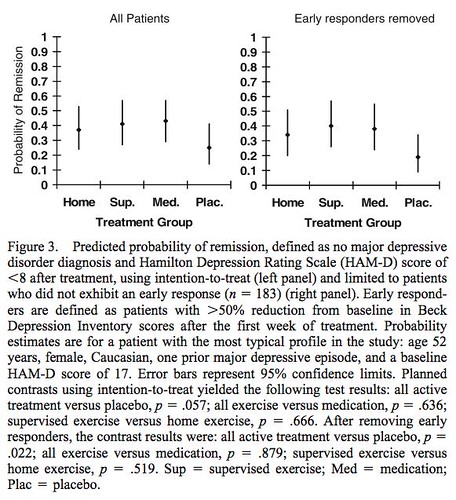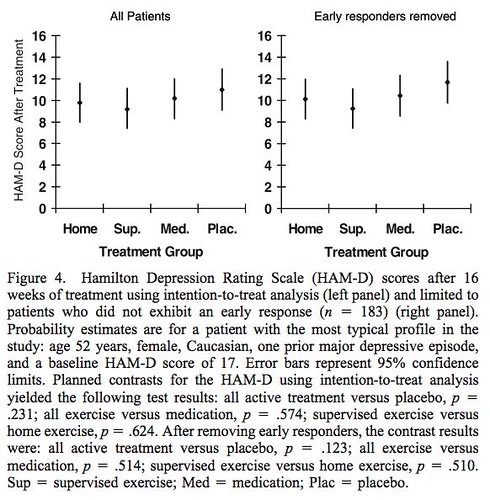tags: researchblogging.org, mental health, depression, major depressive disorder, MDD, exercise, James A. Blumenthal
Image: Lucozade Sport.
"A lot of people know from their own experience that when they exercise, they feel better," observed James A. Blumenthal, a professor of psychology at Duke University and lead author of a newly published study that examined the relationship between exercise and depression. But does this anecdote hold up when examined in a scientific study? And how much better does exercise make one feel? According to this study, exercise is as effective at reducing the symptoms of major depression as taking an antidepressant.
To do this study, Blumenthal and his colleagues assessed people's depressive symptoms using the Hamilton Depression Rating Scale (HAM-D) to determine if they were eligible to be included in this study. The HAM-D is a 21-question multiple choice questionnaire that is used to rate the severity of a patient's depression. The higher the score that an individual receives, the more depressed that he or she is. This test is presently one of the most commonly used scales for rating depression in medical research.
After choosing a group of 202 mildly- to moderately-depressed individuals, Blumenthal's team divided them into four separate treatment groups; people who took the antidepressant Zoloft, people who didn't take Zoloft but who instead exercised as part of a supervised group, people who didn't take Zoloft but who exercised on their own, and a control group of people who took a placebo.
After 16 weeks of treatment, 47% of the people who took the antidepressant Zoloft showed improvement according to their HAM-D scores. But 45% of those who exercised in supervised groups also improved, and 40% of those who exercised on their own likewise improved -- findings that are statistically insignificant from the drug group result. In fact, there was no difference in improvement between the various treatment groups. Additionally, 31% of those people in the placebo group improved, which is consistent with the observed placebo effect (Figure 3, right panel, below);
Further, HAM-D scores were improved for the exercise and medications groups than for those people receiving placebos (Figure 4, left panel, below). Further, after all the people who showed a marked improvement within one week of initiating the treatment were disqualified (these are the so-called "early responders"), there was still no statistical difference in remission of depressive symptoms between exercise groups and the medications group, nor between the two exercise groups (Figure 4, right panel, below);
How long does this effect last? A previous study by Blumenthal suggested that depressed patients experienced remission from their depressive symptoms that lasted more than four months after treatment concluded. However, that previous study did not include a placebo ("control") group, so it was not possible to distinguish between those people who improved due to the passage of time, staff attention or due to their own positive expectations rather than due to the effects of medications or exercise.
Why does exercise appear to help improve depressed people's moods? In his paper, Blumenthal and his colleagues speculate that exercise may increase endorphin or serotonin levels, which are the so-called "feel-good" brain chemicals, or perhaps is effect is due to a variety of psychological factors. Of course, Blumenthal's team do caution researchers and the public from drawing firm conclusions regarding the effects of exercise on depression, but this study is promising, expecially when one considers the fact that some people refuse to take their medications on a consistent basis, and other people, such as pregnant or nursing women, are recommended not to take antidepressants.
This study was published in the September issue of the journal Psychosomatic Medicine.
Sources
"Exercise and Pharmacotherapy in the Treatment of Major Depressive Disorder" by James A. Blumenthal, Michael A. Babyak, P. Murali Doraiswamy, Lana Watkins, Benson M. Hoffman, Krista A. Barbour, Steve Herman, W. Edward Craighead, Alisha L. Brosse, Robert Waugh, Alan Hinderliter, and Andrew Sherwood. Published early in Psychosomatic Medicine on September 10, 2007 as 10.1097/PSY.0b013e318148c19a [free PDF]
LATimes (quote)
- Log in to post comments




This is the first time I have ever accessed this site, and found it to be very informative. I am a member of a weather site where we post photos and access weather reports all over the world among other great features the site has. I happened to be looking at one members photos and reading a blog about spiders and from that link I ended up here reading about exorcise and depression. Then I just started exploring and reading other information. I'm posting mainly to say, it's a great site! I now have it bookmarked. Thanks for some great information!
People on SSRIs often find that exercise sort of enhances or kick-starts the meds. These two forms of depression treatment go very well together (as opposed to, say, Prozac and alcohol, or exercise and cigarettes).
I know, I know, easy to say...
Your site is really informative, want to share your links with my readers if you please.
This result keeps coming up again and again when tested. Exercise is as good as drugs. But why?
Is it a common factor?
What about the fact that with both exercise AND medication people feel like something is being done. Could it all boil down to something as simple as that?